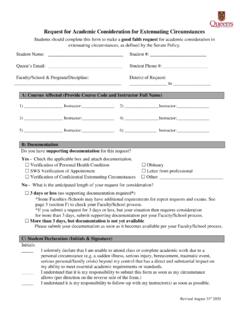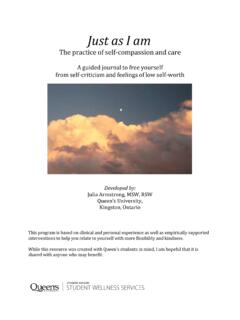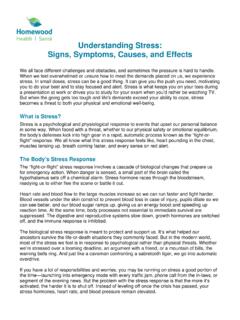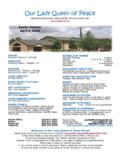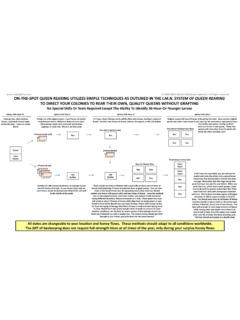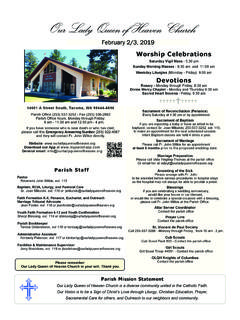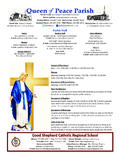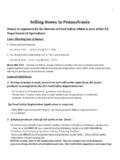Transcription of CONTENTS
1 Approved by the queen s University Board of Trustees July 13, 2018 queen S UNIVERSITY STUDENT CODE OF CONDUCT CONTENTS I PREAMBLE .. 2 II queen S UNIVERSITY STUDENT CODE OF CONDUCT IS A BEHAVIOURAL CONTRACT .. 2 III DEFINITIONS .. 2 IV SCOPE .. 4 V INTAKE AND REFERRAL OF NON-ACADEMIC MISCONDUCT CASES .. 5 VI TYPES OF NON-ACADEMIC 7 A. ABUSE OF 7 B. AIDING IN THE COMMISSION OF AN OFFENCE .. 7 C. ALCOHOL AND DRUG USE .. 8 D. CONTRAVENTION OF POLICY OR LAW .. 8 E. DISRUPTION OR INTERFERENCE .. 8 F. IMPROPER USE OF DANGEROUS OBJECTS AND SUBSTANCES .. 9 G. MISCONDUCT AGAINST PERSONS AND DANGEROUS 9 H. MISCONDUCT INVOLVING PROPERTY .. 10 I. MISREPRESENTATION, FAILING TO PROVIDE, OR PROVIDING, FALSE INFORMATION .. 10 J. MISUSE OF UNIVERSITY INFORMATION TECHNOLOGY .. 10 K. UNAUTHORIZED ENTRY AND/OR 10 VII SANCTIONS .. 11 VIII APPEALS .. 12 IX RELATED POLICIES: .. 13 P a g e | 2 Approved by the queen s University Board of Trustees July 13, 2018 queen S UNIVERSITY STUDENT CODE OF CONDUCT I PREAMBLE queen s University (the University or queen s ) is dedicated to learning, intellectual inquiry, the dissemination and advancement of knowledge, personal and professional development, and good citizenship.
2 Students are responsible individuals and members of society with rights and responsibilities as learners and citizens in the communities in which they learn and live. Students are expected to adhere to and promote the University s core values of honesty, trust, fairness, respect and personal responsibility in all aspects of University life, academic and non- academic. It is these core values that are intended to inform and guide Student conduct as they foster mutual respect for the dignity, property, rights and well-being of others. The University values integrity, inclusiveness and teamwork. To this end, the University is committed to providing developmental and educational opportunities in response to student conduct issues when appropriate. The University is a place for Student growth and development. The non-academic misconduct system at queen s ( NAM System ) is part of that broader learning environment.
3 The principles of education, well-being of students, the safety and well-being of the university community, deterrence, restitution, and where appropriate, Restorative Justice, will guide decision-makers within the NAM System. This Student Code of Conduct ( Code ) outlines the kinds of activities and behaviours that constitute non-academic Student misconduct and associated sanctions. II queen S UNIVERSITY STUDENT CODE OF CONDUCT IS A BEHAVIOURAL CONTRACT Upon registering in a course or program of study offered by or through queen s University and while a Student remains registered in any course or program of study at queen s, every Student enters into a contractual relationship with the University by which they: a) acknowledge the right of the University to set standards of conduct; b) accept and agree to be subject to the University s policies, rules and procedures, including this Code of Conduct; and, c) accept the right of the University and/or its Authorized Agent(s) to impose sanctions for conduct found to have violated those standards, policies, rules or procedures.
4 III DEFINITIONS Authorized Agents means an entity or organization authorized by formal written agreement with the University to administer, on behalf of the University, the non-academic misconduct cases referred to it by the NAM Intake Office. Diversion Process means the process by which a case of non-academic misconduct may be diverted to an alternate University process that is determined to be more appropriate to the health and wellbeing of the Student. This may involve the student-at-risk process or other similar processes that may be established by the University from time to time. P a g e | 3 Approved by the queen s University Board of Trustees July 13, 2018 Guest means a person who is visiting a Student on campus; this includes student Guests and non-student Guests. Host means a Student who hosts a Guest, while the Student is a participant in any course or program of study at queen s, on campus; this includes student Guests and non-student Guests.
5 Incident Report means the information received and compiled by the NAM Intake Office for the purposes of initial assessment and referral to the appropriate NAM Unit. Non-Academic Misconduct is described below in Section V: Types of Non-Academic Misconduct; it is classified as either Category 1 or Category 2 by the NAM Intake Office. The Categories and the factors to be considered in are described in more detail in Section IV: Referral and Carriage of Non-academic Misconduct Cases. Non Academic Misconduct System / NAM System means the totality of: a) all NAM Units; b) the NAM Intake Office; c) this Code; d) all procedures, guidelines and instructions concerning the administration of this Code issued by a NAM Unit; and, e) the University Student Appeals Board in its capacity as the University s final internal adjudicative body for non-academic misconduct cases. NAM Intake Office means the University Office that receives and refers reports of Student non- academic misconduct in accordance with the criteria set out in this Code.
6 NAM Roundtable serves as an informal forum for those involved in the operation of the University s non-academic misconduct system. NAM Subcommittee ( NAMSC ) means the sub-committee of the Audit and Risk Committee of the queen s Board of Trustees, which is responsible for receiving reports about the NAM System and for recommending to the Board, via the Audit and Risk Committee, any proposed changes to this Code. NAM Unit: means each of the Student Conduct Office, Athletics and Recreation, Residences, and any Authorized Agent of the University, involved in the administration of this Code. Public Official includes law enforcement officers, fire & rescue personnel, paramedics, by-law officers, and other similar municipal, provincial or federal officials, acting in their professional capacity. Restorative Justice emphasizes the importance of elevating the role of victims and community members through active involvement in the misconduct process, holding Students directly accountable to the people and communities harmed by their conduct, restoring the emotional and material losses of victims, and providing a range of opportunities for dialogue, negotiation, and problem solving, whenever possible.
7 The goal is to achieve a greater sense of community safety and social harmony for all involved, and, requires the willing participation of Students and victims together. Sanctioned Activity means an activity that has been approved by the University (through a University administrator authorized to do so), by a student government, or by an Authorized Agent of the University. Student means anyone who is registered, full-time or part-time, in a course or program of study, including a non-degree diploma or certificate (whether for credit or not), offered by or through the P a g e | 4 Approved by the queen s University Board of Trustees July 13, 2018 University, or anyone who was so registered when the reported misconduct was said to have occurred. It also means a person registered at another university on a letter of permission from queen s and a person on exchange at queen s or abroad. Student Conduct Office means the University Office that handles cases of alleged Category 2 non- academic misconduct.
8 Student Group means any extracurricular organization or club that is recognized or ratified by the University, by a student government, or, by any Authorized Agent of the University. University means queen s University at University Property means property owned, rented or otherwise used by the University. University Student Appeal Board ( USAB ) means the University s final internal adjudicative body. IV SCOPE This Code applies to non-academic misconduct by a Student or group of Students that takes place: a. on University Property; b. off University Property, in circumstances where: i. a Student is participating in a Sanctioned Activity, regardless of where that activity takes place; ii. a Student s conduct has a real and substantial connection to the legitimate interests of the University, which include, but are not limited to, its reputation or goodwill in the community; or, iii. a Student represents, claims to represent or would reasonably be perceived to be representing, the University or an organization affiliated with the University; and, c.
9 Through electronic media, regardless of where it originates, where there is a clear connection to the University community. This Code covers non-academic misconduct that occurs in the context of an academic program, including conduct that occurs when a Student is participating in: a. any class activity, including a lecture, tutorial, lab or the like, on University Property; and, b. any organized academic activity, such as a clinical placement, exchange, field placement, field trip, internship, research activities, or the like, that occurs off University Property. Students are responsible for advising their Guests about this Code and the required standards of appropriate conduct. Students are responsible for the conduct of their Guest(s), including violation(s) of this Code, if the Student encouraged the misconduct, or if the Student knew of, or could have reasonably foreseen, the misconduct and failed to take steps to discourage or prevent it, or to advise Campus Security & Emergency Services.
10 Students will be held individually responsible for their actions, whether acting on their own or as part of a group. Student Groups and/or their leaders or any identifiable spokesperson for a Student Group can be held responsible, collectively and/or individually, for violations of this Code by their members or by participants in their Group s activities, whether sanctioned or not, and whether on or off University 1 queen s University at Kingston is the formal legal name of the institution; it does not refer to any geographical boundary. P a g e | 5 Approved by the queen s University Board of Trustees July 13, 2018 Property, if the leaders gave encouragement or consent for the misconduct, or if they knew of, or could have reasonably foreseen, the misconduct and failed to take steps to discourage or prevent it, or to advise Campus Security & Emergency Services. Nothing in this Code replaces or supersedes any complaint, grievance or appeal process set out in any collective agreement to which the University is a party.


